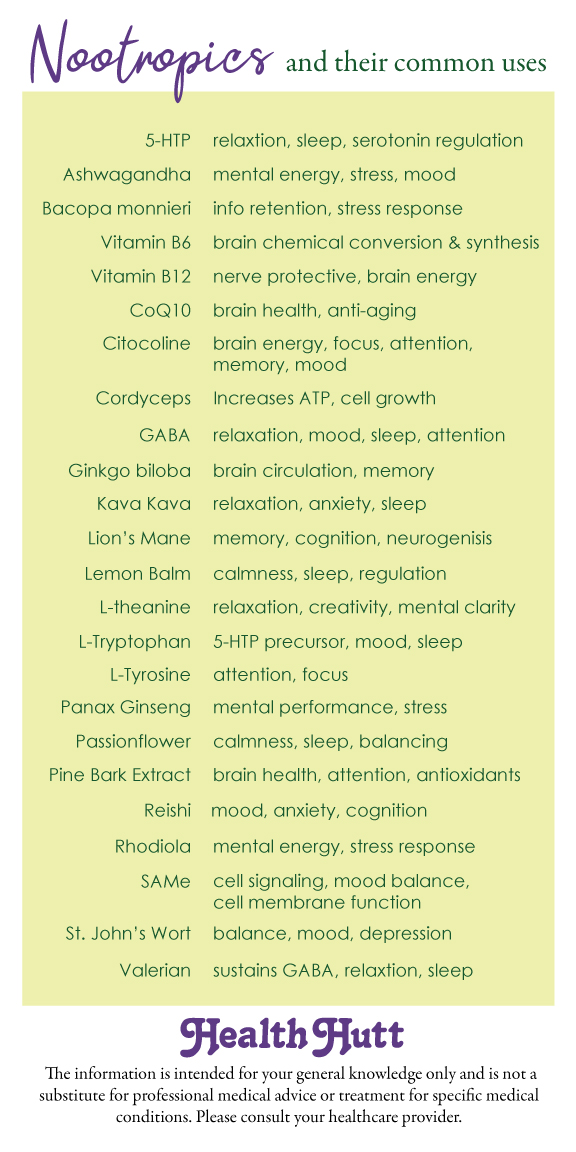Nootropic is a term used to describe supplements or ingredients that enhance cognitive performance. Cognitive performance refers to the functioning of cognitive processes in daily life. These processes include:
-
attention, focus, concentration
-
learning, information synthesis, integration of past knowledge, and assimilating new information
-
language, comprehension, communication
-
perception, gathering information with senses, reaction
-
memory, encoding, storing, and recalling information
-
thought, reasoning, decision making, problem solving (1)
The brain uses A LOT of energy. Brain fog and mental fatigue occur when the brain is low on energy. The primary source of energy for cells is ATP or adenosine triphosphate, which is mainly produced by mitochondria when the brain isn’t active (i.e. while you sleep or are unconscious). (2)
Some nootropics help to increase or optimize ATP production. Some nootropics modulate neurotransmitters (serotonin, dopamine, norepinephrine, epinephrine). Some nootropics help with the structural integrity and healthy aging of the brain. The overall theme of nootropics is better mental performance and mindset. It’s likely that you have heard of many supplements that have been classified as nootropic.
See Figure 1 for a list of some popular Nootropics and their common uses. This list doesn't cover all nootropics.
It is well known that mindfulness practices, meditation, and breathing help modulate stress response, promote relaxation, and encourage better mood. These three lifestyle habits may also be ways to effect ATP. Routine mindfulness practice has been found to protect mitochondria and change gene profiles in such a way that more healthy genes became more active. (3) The effects of the healthy genes include improved mitochondrial function. (3) It has been found that meditation effects how the brain manages energy. (4)
Wim Hof of the Wim Hof Method speaks about the breathing exercise he uses effecting neurotransmitters and producing more energy in the cells, just like when we sleep. A 2014 study at Radboud University showed that participants were able to control their sympathetic nervous system and immune response with Wim Hof Method breathing and meditation. So, in addition to sleep, these may be other ways to create energy for the brain as research continues.

Figure 1: Nootropics and their common uses.
In summary, a lifestyle that supports cognitive performance, brain health, and mindset can include a mixture of good sleep, mindfulness practices, meditation, breathing, and nootropic supplementation. You can choose which nootropics best fit your needs whether it be focus, mood, energy, or brain health.
Sources
- Gizewski, Elke R et al. “Short-term meditation training influences brain energy metabolism: A pilot study on 31 P MR spectroscopy.” Brain and behavior vol. 11,1 (2021): e01914. doi:10.1002/brb3.1914
- What is Peak Brain Peformance. Senses Wellness Retreat. Retrieved from https://senseswellnessretreat.com/cognitive-performance/ on January 20, 2023
- How Do Nootropics Work? Nootropics Expert. Retrieved from https://nootropicsexpert.com/how-do-nootropics-work/on January 20, 2023
- Discover New Energy with Mindfulness and Mitochondria. Dr Thad Gala. Retrieved from https://drthadgala.com/discover-new-energy-with-mindfulness-and-mitochondria/ January 20, 2023
